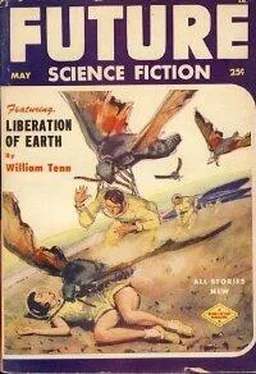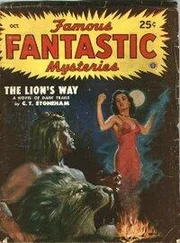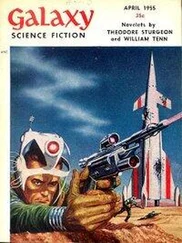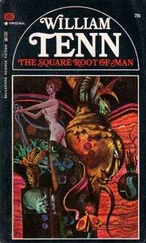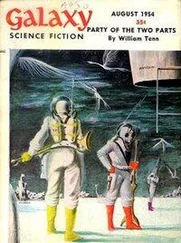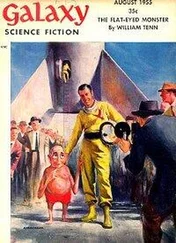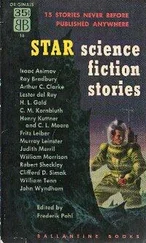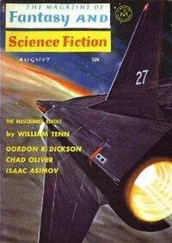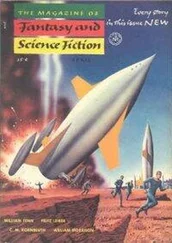William Tenn - The Liberation of Earth
Здесь есть возможность читать онлайн «William Tenn - The Liberation of Earth» весь текст электронной книги совершенно бесплатно (целиком полную версию без сокращений). В некоторых случаях можно слушать аудио, скачать через торрент в формате fb2 и присутствует краткое содержание. Год выпуска: 1953, Издательство: Columbia Publications, Inc., Жанр: Фантастика и фэнтези, на английском языке. Описание произведения, (предисловие) а так же отзывы посетителей доступны на портале библиотеки ЛибКат.
- Название:The Liberation of Earth
- Автор:
- Издательство:Columbia Publications, Inc.
- Жанр:
- Год:1953
- ISBN:нет данных
- Рейтинг книги:4 / 5. Голосов: 1
-
Избранное:Добавить в избранное
- Отзывы:
-
Ваша оценка:
- 80
- 1
- 2
- 3
- 4
- 5
The Liberation of Earth: краткое содержание, описание и аннотация
Предлагаем к чтению аннотацию, описание, краткое содержание или предисловие (зависит от того, что написал сам автор книги «The Liberation of Earth»). Если вы не нашли необходимую информацию о книге — напишите в комментариях, мы постараемся отыскать её.
The Liberation of Earth — читать онлайн бесплатно полную книгу (весь текст) целиком
Ниже представлен текст книги, разбитый по страницам. Система сохранения места последней прочитанной страницы, позволяет с удобством читать онлайн бесплатно книгу «The Liberation of Earth», без необходимости каждый раз заново искать на чём Вы остановились. Поставьте закладку, и сможете в любой момент перейти на страницу, на которой закончили чтение.
Интервал:
Закладка:
Cooperation with our liberators took precedence over all other human activities. The order of the day was a slogan first given voice by a Harvard professor of government in a querulous radio round table on “Man’s Place in a Somewhat Overcivilized Universe.”
“Let us forget our individual egos and collective conceits,” the professor cried at one point. “Let us subordinate everything—to the end that the freedom of the solar system in general, and Earth in particular, must and shall be preserved!”
Despite its mouth-filling qualities, this slogan was repeated everywhere. Still, it was difficult sometimes to know exactly what the Dendi wanted—partly because of the limited number of interpreters available to the heads of the various sovereign states, and partly because of their leader’s tendency to vanish into his ship after ambiguous and equivocal statements—such as the curt admonition to “Evacuate Washington!”
On that occasion, both the Secretary of State and the American President perspired fearfully through five hours of a July day in all the silk-hatted, stiff-collared, dark-suited diplomatic regalia that the barbaric past demanded of political leaders who would deal with the representatives of another people. They waited and wilted beneath the enormous ship—which no human had ever been invited to enter, despite the wistful hints constantly thrown out by university professors and aeronautical designers—they waited patiently and wetly for the Dendi leader to emerge and let them know whether he had meant the State of Washington or Washington, D.C.
The tale comes down to us at this point as a tale of glory. The capitol building taken apart in a few days and set up almost intact in the foothills of the Rocky Mountains; the missing Archives that were later to turn up in the Children’s Room of a Public Library in Duluth, Iowa; the bottles of Potomac River water carefully borne westward and ceremoniously poured into the circular concrete ditch built around the President’s mansion (from which, unfortunately, it was to evaporate within a week because of the relatively low humidity of the region)—all these are proud moments in the galactic history of our species, from which not even the later knowledge that the Dendi wished to build no gun site on the spot, nor even an ammunition dump, but merely a recreation hall for their troops, could remove any of the grandeur of our determined cooperation and most willing sacrifice.
There is no denying, however, that the ego of our race was greatly damaged by the discovery, in the course of a routine journalistic interview, that the aliens totaled no more powerful a group than a squad; and that their leader, instead of the great scientist and key military strategist that we might justifiably have expected the Galactic Federation to furnish for the protection of Terra, ranked as the interstellar equivalent of a buck sergeant.
That the President of the United States, the Commander-in-Chief of the Army and the Navy, had waited in such obeisant fashion upon a mere noncommissioned officer was hard for us to swallow, but that the impending Battle of Earth was to have a historical dignity only slightly higher than that of a patrol action was impossibly humiliating.
And then there was the matter of “lendi.”
The aliens, while installing or servicing their planetwide weapon system, would occasionally fling aside an evidently unusable fragment of the talking metal. Separate from the machine of which it had been a component, the substance seemed to lose all those qualities which were deleterious to mankind and retain several which were quite useful indeed. For example, if a portion of the strange material was attached to any terrestrial metal—and insulated carefully from contact with other substances—it would, in a few hours, itself become exactly the metal that it touched, whether that happened to be zinc, gold, or pure uranium.
This stuff—“lendi,” men have heard the aliens call it—was shortly in frantic demand in an economy ruptured by constant and unexpected emptyings of its most important industrial centers.
Everywhere the aliens went, to and from their weapon sites, hordes of ragged humans stood chanting—well outside the two-mile limit—“Any lendi, Dendi?” All attempts by law-enforcement agencies of the planet to put a stop to this shameless, wholesale begging were useless—especially since the Dendi themselves seemed to get some unexplainable pleasure out of scattering tiny pieces of lendi to the scrabbling multitude. When policemen and soldiery began to join the trampling, murderous dash to the corner of the meadows wherein had fallen the highly versatile and garrulous metal, governments gave up.
Mankind almost began to hope for the attack to come, so that it would be relieved of the festering consideration of its own patent inferiorities. A few of the more fanatically conservative among our ancestors probably even began to regret liberation.
They did, children; they did! Let us hope that these would-be troglodytes were among the very first to be dissolved and melted down by the red flame-balls. One cannot, after all, turn one’s back on progress!
Two days before the month of September was over, the aliens announced that they had detected activity upon one of the moons of Saturn. The Troxxt were evidently threading their treacherous way inward through the solar system. Considering their vicious and deceitful propensities, the Dendi warned, an attack from these worm-like monstrosities might be expected at any moment.
Few humans went to sleep as the night rolled up to and past the meridian on which they dwelt. Almost all eyes were lifted to a sky carefully denuded of clouds by watchful Dendi. There was a brisk trade in cheap telescopes and bits of smoked glass in some sections of the planet, while other portions experienced a substantial boom in spells and charms of the all-inclusive, or omnibus, variety.
The Troxxt attacked in three cylindrical black ships simultaneously: one in the Southern Hemisphere, and two in the Northern. Great gouts of green flame roared out of their tiny craft, and everything touched by this imploded into a translucent, glass-like sand. No Dendi was hurt by these, however, and from each of the now-writhing gun mounts there bubbled forth a series of scarlet clouds which pursued the Troxxt hungrily, until forced by a dwindling velocity to fall back upon Earth.
Here they had an unhappy after-effect. Any populated area into which these pale pink cloudlets chanced to fall was rapidly transformed into a cemetery—a cemetery, if the truth be told as it has been handed down to us, that had more the odor of the kitchen than the grave. The inhabitants of these unfortunate localities were subjected to enormous increases of temperature. Their skin reddened, then blackened; their hair and nails shriveled; their very flesh turned into liquid and boiled off their bones. Altogether a disagreeable way for one-tenth of the human race to die.
The only consolation was the capture of a black cylinder by one of the red clouds. When, as a result of this, it had turned white-hot and poured its substance down in the form of a metallic rainstorm, the two ships assaulting the Northern Hemisphere abruptly retreated to the asteroids into which the Dendi—because of severely limited numbers—steadfastly refused to pursue them.
In the next twenty-four hours, the aliens— resident aliens, let us say—held conferences, made repairs to their weapons, and commiserated with us. Humanity buried its dead. This last was a custom of our forefathers that was most worthy of note, and one that has not, of course, survived into modern times.
By the time the Troxxt returned, Man was ready for them. He could not, unfortunately, stand to arms as he most ardently desired to do, but he could and did stand to optical instrument and conjurer’s oration.
Читать дальшеИнтервал:
Закладка:
Похожие книги на «The Liberation of Earth»
Представляем Вашему вниманию похожие книги на «The Liberation of Earth» списком для выбора. Мы отобрали схожую по названию и смыслу литературу в надежде предоставить читателям больше вариантов отыскать новые, интересные, ещё непрочитанные произведения.
Обсуждение, отзывы о книге «The Liberation of Earth» и просто собственные мнения читателей. Оставьте ваши комментарии, напишите, что Вы думаете о произведении, его смысле или главных героях. Укажите что конкретно понравилось, а что нет, и почему Вы так считаете.
